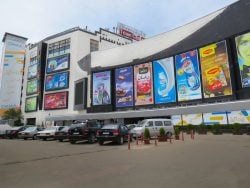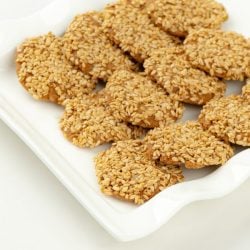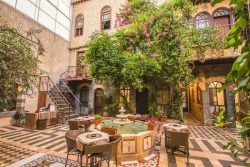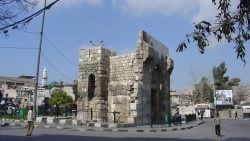6 Memorable Syrian Series We Grew Up Watching
Syrian drama reached its peak between the late 90s and the late 2000s. With only two channels to watch shows on before the satellite and digital era, we all grew up on Syrian TV series that became a part of our memories. Let’s take a trip down memory lane:
1. Al-Fosoul Al-Arbaa
This series holds a special place in the hearts of Syrians, especially those from the 90s generation. We watched its two seasons on Syrian TV during Ramadan in 1999 and 2002. It tells the story of a family with five siblings, dealing with everyday life issues that any Syrian family might face at that time. We connected with it because we saw ourselves or someone from our families in one of its characters. Characters like Adel, Najeeb, and Grandpa Kareem still linger in our minds, along with their memorable reactions and actions. Even the opening theme, originally a classical piece, remains tied to the show in our memories.
2. Al-Khawali
This was the second Damascus-centered series directed by Bassam Al-Malla and the first to be filmed outside a studio. It depicts the resistance against the Ottoman occupation, centered on the hero Nassar Ibn Areebi, who became a trend back then, especially among kids who imitated him and his famous line, “Yehram Alayi Shawfet El Meme” or “I swear by my mother…” Al-Khawali portrayed a sweet love story, highlighted family values, friendship, and patriotism, and depicted life during the Ottoman rule in Syria.
3. Abna’ Al-Qahr
This series gained a lot of attention for addressing sensitive issues, particularly AIDS. It also touched on family unity and youth recklessness. With young stars like Qusai Khouli and Bassel Khayat, who are big names now, this series was a phenomenon. The mask featured in the show even became a popular toy, and it marked the beginning of a series of shows written by Hani Al-Saadi.
4. Aila Al-Nujoum
Almost every Syrian has watched at least one episode of the series “Ailat 5 Nujoum,” “Ailat 6 Nujoum,” or “Ailat 7 Nujoum.” These comedy series, seen by some as slapstick and by others as entertaining, were the first Syrian sitcoms. They brought laughter to Syrian audiences with stars who have now become comedy legends, like Bassam Yakhour, Shukran Murtaja, and Samia Al-Jazaery. Directed by Hisham Sharbatji, these shows were even popular in the Gulf, airing on Emirati channels before being shown in Syria.
5. Jameel and Hana (Seasons 1 & 2)
Another sitcom, starring Ayman Zidan and Norma Al-Saad in the first season. Jameel, who thinks Hana doesn’t care about him, tries everything to make her jealous, and in the final episode, he succeeds, turning her into a jealous wife. Who can forget the catchphrase “Shako Shako”? In the second season, he regrets planting the seed of suspicion and tries to convince her otherwise. Characters from this show remain memorable today, along with their phrases and actions, especially Um Mahmoud and her son, who lives in Khorfakkan.
6. Maraya
Yasser Al-Azmeh’s “Maraya” series is one of the most famous shows featuring standalone episodes. It discussed social and everyday issues in a comedic, satirical, and critical manner, presenting deep ideas in a simple way unique to Yasser Al-Azmeh and a group of actors like Salim Kallas, Hasan Dakkak, and Maha Al-Masri. The series began in the 80s and concluded in 2013, with its peak in 1998 and 1999, directed by Hatem Ali. We can’t mention “Maraya” without recalling episodes like “Het Bel Kherej,” “The Baccalaureate,” and “The Black Diamond,” or the village episodes where Yasser Al-Azmeh spoke in a different dialect while the rest of the actors spoke in a regular Damascus dialect.
These shows not only became a part of our memories as Syrians and represented the success of Syrian drama locally but also played a role in spreading it across the Arab world and paving the way for their actors to become big stars today.
Make sure to follow us on Instagram for more content like this!





